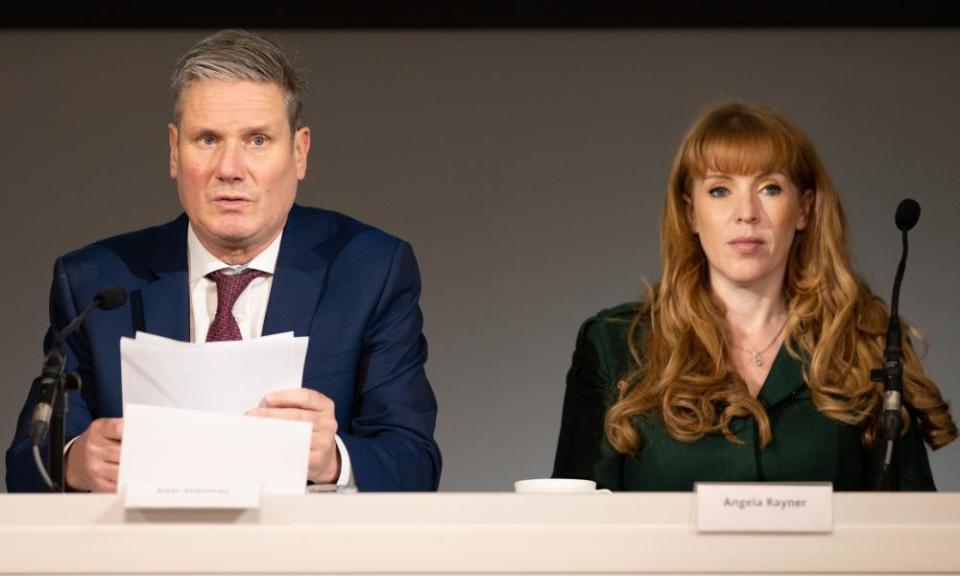Starmer has put Labour rightwingers back in control – are they up to the task?

The Labour leader promised to unite the party, but it seems that factional vendettas have replaced political strategy
For the first time since Labour’s 2019 rout, the government is in serious trouble. After being allowed to get away with their fatal handling of the pandemic, the Tories self-detonated over scandals and broken promises from rail to tax. Enter the Labour deputy leader, Angela Rayner, with a speech – over which her team toiled for weeks – hammering Boris Johnson over corruption and setting out proposals to combat it. You’d imagine any competent, strategic operation around Keir Starmer would gladly throw its weight behind such an endeavour. But his team had other ideas.
By launching a shadow cabinet reshuffle without consulting his deputy, Starmer has ignited a new round of internal conflict. Rayner’s operation is adamant that the deputy leader had no adequate forewarning and was not consulted, despite Starmer’s team briefing to the contrary. There is a consistent pattern when it comes to Rayner’s treatment at the hands of the leadership. They scapegoated her for Labour’s catastrophic defeat in Hartlepool earlier this year, sacking her as party chair; criticised her choice of clothing; repeatedly briefed against her, including when she was on bereavement leave; and only belatedly defended her when she was subjected to death threats.
Related: Lisa Nandy backs Keir Starmer over Labour reshuffle rift
As for the reshuffle itself, as one senior Labour source told me: “The Blairite coup continues.” Wes Streeting (who some in Starmer’s team see as the next leader) and Bridget Phillipson from the party’s right have been promoted to shadow health and education minister respectively. Any remaining hopes that Labour will offer a radical economic alternative were kiboshed by the promotion of Pat McFadden – who blamed the party’s 2015 defeat on Ed Miliband “turning the page on New Labour” – as shadow secretary to the Treasury.
Starmer has received much kudos for appointing Yvette Cooper to her former role as shadow home secretary. If her tenure between 2011 and 2015 is anything to go by – during which she scored vanishingly few political hits against the minister she shadowed, Theresa May – we may see the party again taking a harder line against migrants. At the time she legitimised anti-migrant rhetoric, demanding it become harder for migrants to receive jobseeker’s allowance and described the pace of immigration under the Labour government as “too fast”.
Those on the left and centre-left lost out during the shake-up. Leftwinger Cat Smith has resigned, citing the failure to readmit Jeremy Corbyn to the parliamentary Labour party and lack of support for proportional representation. Business and industrial strategy was taken away from Ed Miliband, although allies believe he emerges enhanced with full control of the green new deal brief. The party’s right want him gone altogether and have repeatedly briefed against him, not least because he unforgivably sinned by suggesting Starmer’s promises on public ownership still stood.
Faces in the shadow cabinet have changed, but Starmer’s strategy, it seems, has not. Despite promising to unite the party – something members took Starmer’s word for – since his election he has marginalised the left. Whatever justified criticisms can be made of Corbyn, he did not pursue a similar strategy: his first shadow cabinet was stacked full of internal critics before they resigned en masse.
But a leadership team with a strategy only for marginalising the left lacks a coherent vision for the country. With Boris Johnson’s Tories willing to turn on the spending taps to shore up their new voter coalition, and with interest rates at an all-time low, Labour should be offering bold, distinctive solutions to both the inequality highlighted by the pandemic and to the climate emergency.
Related: The biggest factor behind Keir Starmer’s reshuffle? A general election in 2023 | Sienna Rodgers
Although self-evidently not enough to win, the 2017 election – in which the electorate were offered radical policies – remains the only time Labour has increased its number of seats in the last quarter of a century. As well as learning from failures, positive lessons should be extracted, which is exactly what Starmer’s leadership pitch promised. But with a top team now largely bereft of advisers and politicians committed to such a prospectus, that seems far-fetched.
Instead, much of Starmer’s team believe that the desirability of positions and policies taken by the party directly correlate to how much they offend the progressive sensibilities of Labour members and core voters. It seems as though factional vendettas are a substitute for a political strategy. As one disillusioned Labour MP who voted for Starmer told me, they will look for any excuse to marginalise and purge the left further. All of this is a gratuitous violation of Starmer’s pledge to unite the party and support policies such as public ownership, scrapping tuition fees and championing migrants’ rights.
Those on the Labour right have long wished to have their party “back”, but by dashing the trust of members, and failing to adjust their thinking to the political and economic moment of today – a completely different era to 1997 – there is a risk that their backwards-looking politics will fail to inspire enough voters to get Labour over the line at the next election. What happens next is on them alone.
• Owen Jones is a Guardian columnist

 Yahoo Finance
Yahoo Finance 